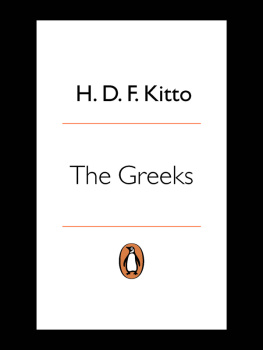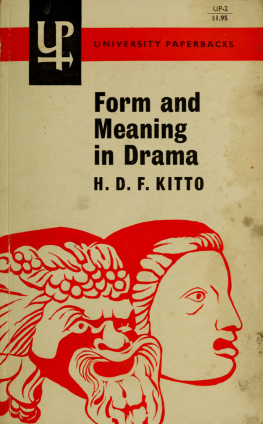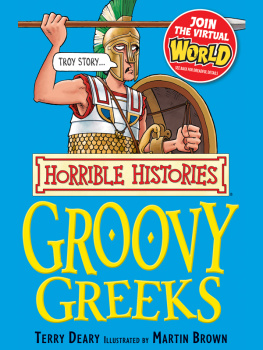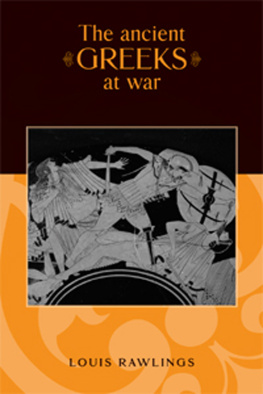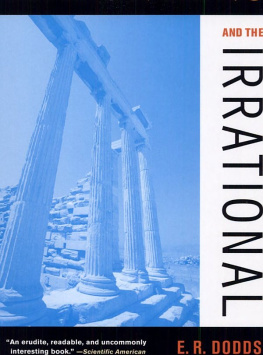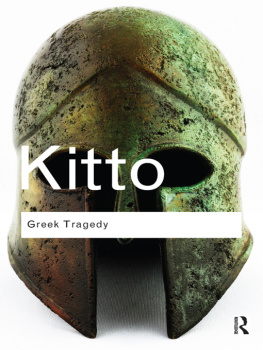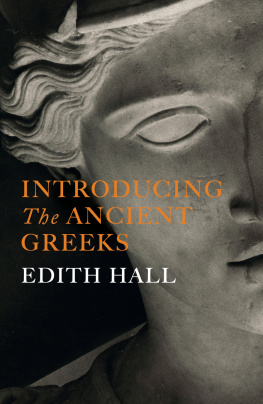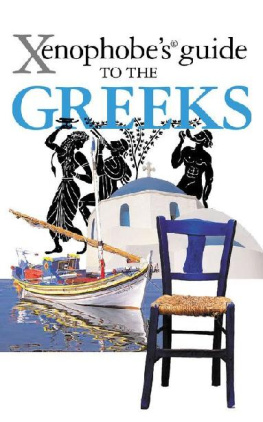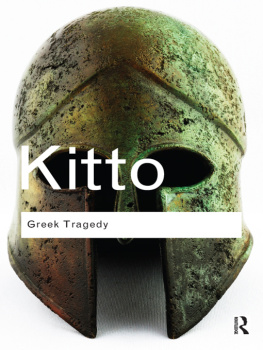H. D. F. Kitto - The Greeks
Here you can read online H. D. F. Kitto - The Greeks full text of the book (entire story) in english for free. Download pdf and epub, get meaning, cover and reviews about this ebook. year: 2013, publisher: Penguin Books Ltd, genre: History. Description of the work, (preface) as well as reviews are available. Best literature library LitArk.com created for fans of good reading and offers a wide selection of genres:
Romance novel
Science fiction
Adventure
Detective
Science
History
Home and family
Prose
Art
Politics
Computer
Non-fiction
Religion
Business
Children
Humor
Choose a favorite category and find really read worthwhile books. Enjoy immersion in the world of imagination, feel the emotions of the characters or learn something new for yourself, make an fascinating discovery.
- Book:The Greeks
- Author:
- Publisher:Penguin Books Ltd
- Genre:
- Year:2013
- Rating:5 / 5
- Favourites:Add to favourites
- Your mark:
- 100
- 1
- 2
- 3
- 4
- 5
The Greeks: summary, description and annotation
We offer to read an annotation, description, summary or preface (depends on what the author of the book "The Greeks" wrote himself). If you haven't found the necessary information about the book — write in the comments, we will try to find it.
The Greeks — read online for free the complete book (whole text) full work
Below is the text of the book, divided by pages. System saving the place of the last page read, allows you to conveniently read the book "The Greeks" online for free, without having to search again every time where you left off. Put a bookmark, and you can go to the page where you finished reading at any time.
Font size:
Interval:
Bookmark:





PENGUIN BOOKS
H. D. F. Kitto was born in 1897, in Stroud, Gloucestershire. He attended the Crypt Grammar School where, as he always said, he was cajoled by a determined headmaster into doing Classics and was grateful ever more. He continued his education as Lecturer in Greek at the University of Glasgow from 1920 to 1944, when he became Professor of Greek at the University of Bristol. He was made Professor Emeritus at Bristol in 1962.
His publications include Greek Tragedy, Form and Meaning in Drama, Sophocles: Dramatist and Philosopher and translations into English verse of Sophodess Antigone, Electra and Oedipus Rex. As a young man he had travelled extensively in Greece, and he wrote a highly praised book about it, In the Mountains of Greece.
Professor Kitto was married, and had two children. He died in January 1982. In his obituary, The Times said of his books: All were informed by an intellectual integrity, wit and a vigorous prose style. But he will be particularly remembered for The Greeks, his remarkable introduction to Classical Greece, a volume which has had and continues to have, a persuasive influence on students approaching Classical Greek studies for the first time.
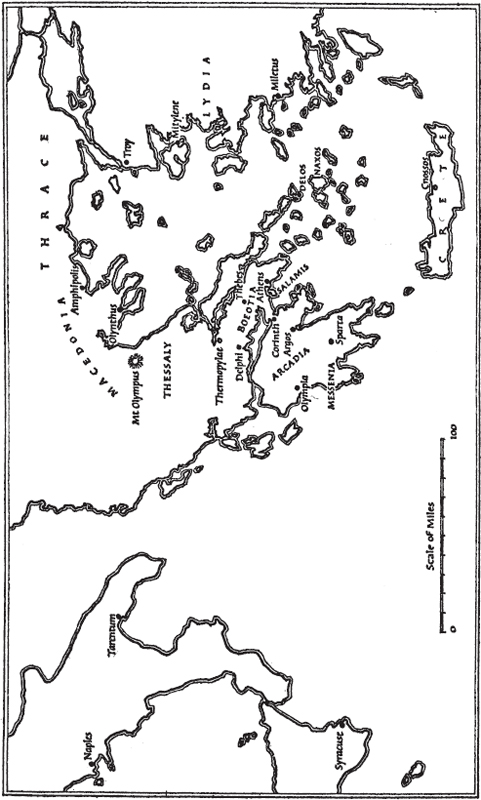

The reader is asked, for the moment, to accept this as a reasonable statement of fact, that in a part of the world that had for centuries been civilized, and quite highly civilized, there gradually emerged a people, not very numerous, not very powerful, not very well organized, who had a totally new conception of what human life was for, and showed for the first time what the human mind was for. This statement will be amplified and, I hope, justified in what follows. We can begin the amplification now by observing that the Greeks themselves felt, in quite a simple and natural way, that they were different from any other people that they knew. At least, the Greeks of the classical period habitually divided the human family into Hellenes and barbarians. The pre-classical Greek, Homer for instance, does not speak of barbarians in this way; not because he was more polite than his descendants, but because this difference had not then fully declared itself.
It was not, in fact, a matter of politeness at all. The Greek word barbaros does not mean barbarian in the modern sense; it is not a term of loathing or contempt; it does not mean people who live in caves and eat their meat raw. It means simply people who make noises like bar bar instead of talking Greek. If you did not speak Greek you were a barbarian, whether you belonged to some wild Thracian tribe, or to one of the luxurious cities of the East, or to Egypt, which, as the Greeks well knew, had been a stable and civilized country many centuries before Greece existed. Barbaros did not necessarily imply contempt. Many Greeks admired the moral code of the Persians and the wisdom of the Egyptians. The debt material, intellectual and artistic which the Greeks owed to the peoples of the East was rarely forgotten. Yet these people were barbaroi, foreigners, and classed with (though not confused with) Thracians, Scythians and such. Only because they did not talk Greek? No; for the fact that they did not talk Greek was a sign of a pro-founder difference: it meant that they did not live Greek or think Greek either. Their whole attitude to life seemed different; and a Greek, however much he might admire or even envy a barbarian for this reason or that, could not but be aware of this difference.
We may note in passing that one other race (not counting ourselves) has made this sharp distinction between itself and all other foreigners, namely the Hebrews. Here were two races, each very conscious of being different from its neighbours, living not very far apart, yet for the most part in complete ignorance of each other and influencing each other not at all until the period following Alexanders conquests, when Greek thought influenced Hebraic thought considerably as in Ecclesiastes. Yet it was the fusion of what was most characteristic in these two cultures the religious earnestness of the Hebrews with the reason and humanity of the Greeks which was to form the basis of later European culture, the Christian religion. But Gentile and Barbaros were very different conceptions; the one purely racial and religious, the other only incidentally racial and not in the least religious. What then led the Greek to make this sharp division? And had it any justification?
It would be one answer, a true and sufficient one, to say that while the older civilizations of the East were often extremely efficient in practical matters and, sometimes, in their art not inferior to the Greeks, yet they were intellectually barren. For centuries, millions of people had had experience of life and what did they do with it? Nothing. The experience of each generation (except in certain purely practical matters) died with it not like the leaves of the forest, for they at least enrich the soil. That which distils, preserves and then enlarges the experience of a people is Literature. Before the Greeks, the Hebrews had created religious poetry, love-poetry, and the religious poetry and oratory of the Prophets, but literature in all its other known forms (except the novel) was created and perfected by the Greeks. The difference between barbarian historical chronicles and Thucydides is the difference between a child and a man who can not only understand, but also make his understanding available to others. Epic poetry, history and drama; philosophy in all its branches, from metaphysics to economics; mathematics and many of the natural sciences all these begin with the Greeks.
Yet if we could ask an ancient Greek what distinguished him from the barbarian, he would not, I fancy, put these triumphs of the Greek mind first, even though he was conscious that he set about most things in a more intelligent way. (Demosthenes, for example, rating his fellow-citizens for their spineless policy towards Philip of Macedon, says You are no better than a barbarian trying to box. Hit him in one spot, and his hands fly there; hit him somewhere else, and his hands go there.) Nor would he think first of the temples, statues and plays which we so justly admire. He would say, and in fact did say, The barbarians are slaves; we Hellenes are free men.
And what did he mean by this freedom of the Greek, and the slavery of the foreigner? We must be careful not to interpret it in political terms alone, though the political reference is important enough. Politically it meant, not necessarily that he governed himself because oftener than not he didnt but that however his polity was governed it respected his rights. State affairs were public affairs, not the private concern of a despot. He was ruled by Law, a known Law which respected justice. If his state was a full democracy, he took his own share in the government and democracy, as the Greek understood it, was a form of government which the modern world does not and cannot know; but if it was not a democracy, he was at least a member, not a subject, and the principles of government were known. Arbitrary government offended the Greek in his very soul. But as he looked out upon the wealthier and more highly civilized countries of the East, this is precisely what he saw: palace-government, the rule of a King who was absolute; not governing, like the early Greek monarch, according to Themis, or a law derived from Heaven, but according to his private will only; not responsible to the gods, because he was himself a god. The subject of such a master was a slave.
Font size:
Interval:
Bookmark:
Similar books «The Greeks»
Look at similar books to The Greeks. We have selected literature similar in name and meaning in the hope of providing readers with more options to find new, interesting, not yet read works.
Discussion, reviews of the book The Greeks and just readers' own opinions. Leave your comments, write what you think about the work, its meaning or the main characters. Specify what exactly you liked and what you didn't like, and why you think so.

